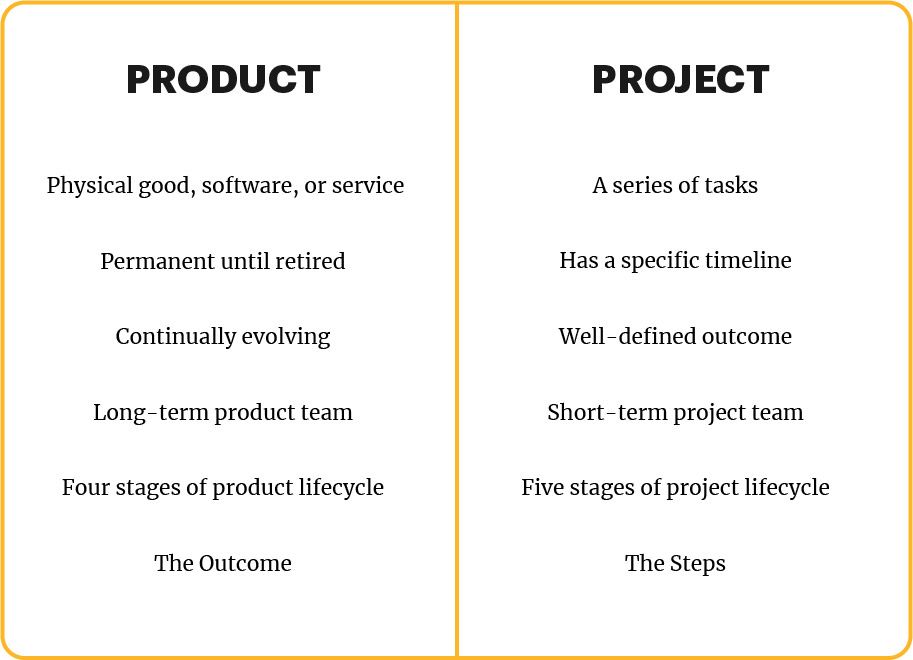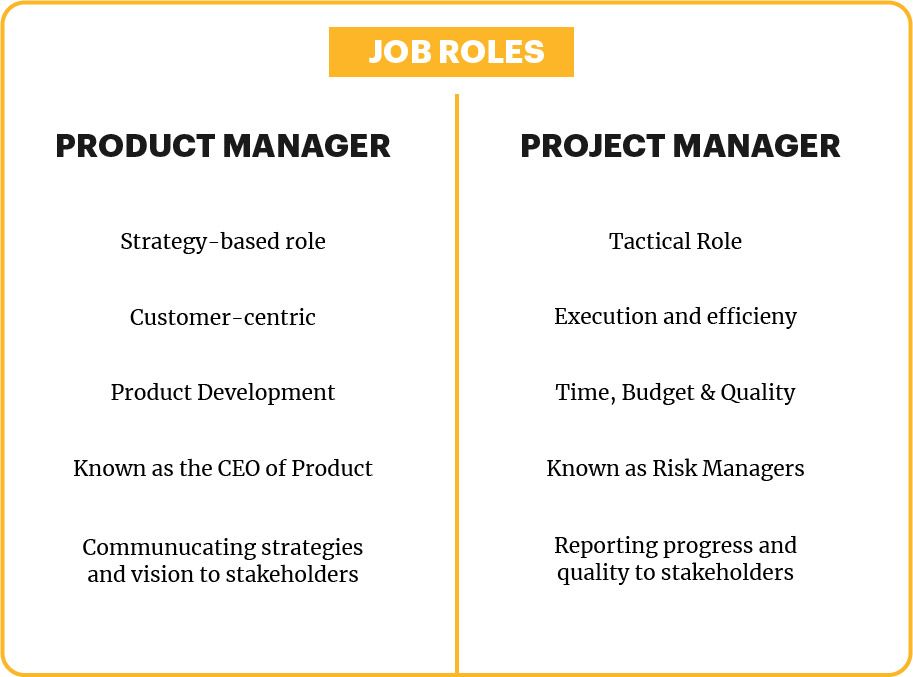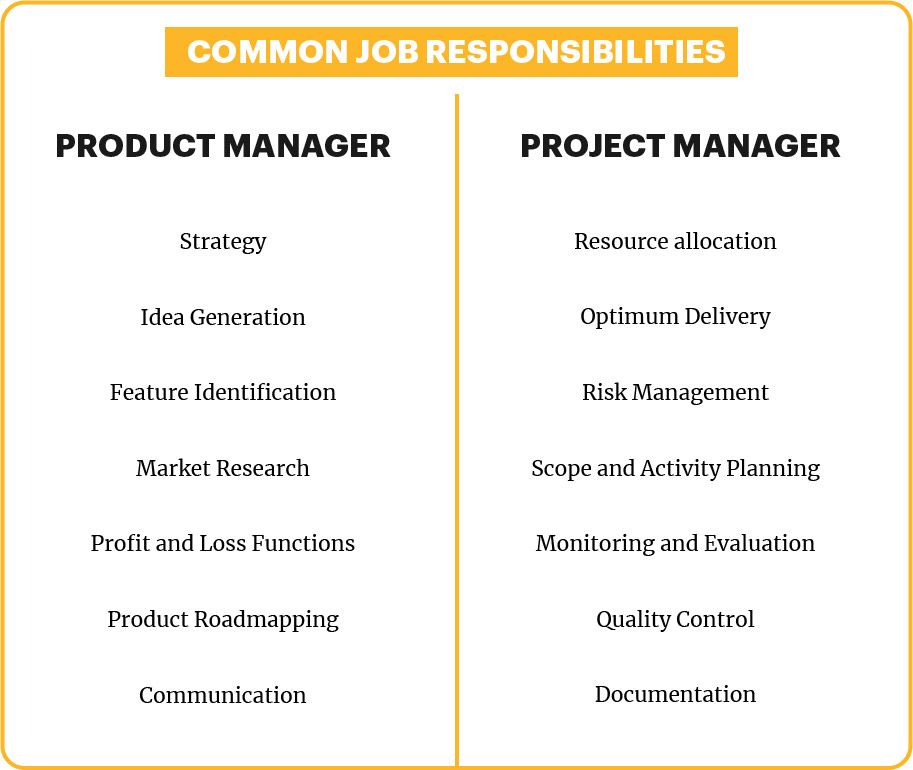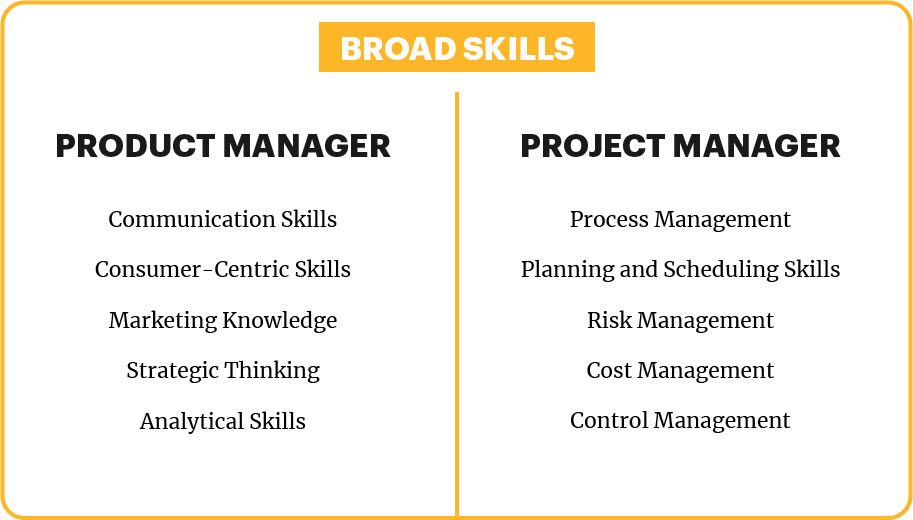There aren’t two more confusing roles than these. Just ask any Product Manager how many times they have been called a Project Manager or vice-versa, and you will understand the reason for this article. Both roles have similar-looking titles, rely on collaborative efforts, and sometimes have overlapping responsibilities. For numerous reasons, product manager vs project manager has been the center of the debate for quite some time.
However, this seemingly harmless confusion may lead to potential areas of conflict. For instance, who decides what’s on the product roadmap? Who manages the product backlog? And who collaborates with whom? Should a product manager take a strategic role or a hands-on approach? Should a project manager focus on execution or customer needs?
Since both positions play a crucial role in product development and will naturally intersect, they need to specify their roles and responsibilities, mark their areas of jurisdiction, and identify avenues for collaboration.
This article will break down the differences between a product manager and a project manager. You will learn about their roles and responsibilities, skill requirements, and salary variations. We will also identify how both these roles overlap and can collaborate for a better outcome. Stay tuned to learn which role suits you the best. Let’s get started.
Product vs Project
Although we regularly use the words —product and project —interchangeably in our team meetings, they are, in theory, two distinct concepts. Let’s start with the formal definition.
A product can be a physical good, software, or service designed to satisfy people’s specific needs. No absolute definition exists on what a product should deliver. Instead, it continually evolves until it becomes fit to fulfill customers’ needs.

A product is more permanent than a project. It acts as a living entity. It develops, interacts with people, is accepted by them, matures into the desired form, and finally, retires from the market. Hence, a product has a specific lifecycle comprising four stages —introduction, growth, maturity, and decline.
On the other hand, a project is only a step in the process of creating a product. A project lifecycle has five stages – initiation, planning, execution, monitoring and evaluation, and closure. It is a temporary endeavor with a specific timeline and a well-defined outcome. Unlike a product manager, a project manager knows exactly what needs to be delivered and when.
The ultimate goal of a product is to avoid the decline phase. Thus, a product development team can initiate several projects under its wing to improve, extend, or diversify product offerings.
“If a product is an outcome, each project is a means to achieve the outcome.”

Let’s see how these core differences affect a product manager and a project manager’s job roles and responsibilities.
What is a Product Manager
Product managers are essentially the CEO of a product line. They are responsible for driving product development and setting the overall product strategy. They translate user needs into product features and lead the development team to construct a Minimum Viable Product (MVP).
Product managers set the vision for a product and communicate it to every level of the organization. They are the glue that holds company-wide communication in place. They collaborate with design, development, sales, marketing, customer support, and any stakeholder responsible for delivering customer needs.
Above all, a product manager is all about having the ‘product sense.’ Remember Spider-Man and his spider-sense? A tingling sensation would alert him whenever danger was nearby. The product sense is also an intuition accumulated from years of experience and education that tells a product manager if a product is ready, when to launch or whether to remove a product line altogether.
What is a Project Manager
A Project Manager, on the other hand, performs a more tactical role and focuses on execution. They break down broad strategic plans into actionable tasks with clear KPIs and supervise a fixed project or multiple projects from scratch to end until they deliver precisely what the company demands. Moreover, project managers are also risk managers since they identify and minimize potential bottlenecks.

A project manager’s role mostly involves executing the vision and strategies passed down by the product team or leadership, developing a timeline, allocating resources, and providing a comprehensive action plan to hit the mark well in time and under budget. All in all, Project Managers make trade-offs between time, budget, and quality.
“Product managers propose strategies to drive product development, whereas Project Managers execute those plans effectively and efficiently.”

Product Manager vs Project Manager: Job Responsibilities
People have a hard time defining the job responsibilities of product managers and project managers. The responsibilities can vary based on the industry, company size, hierarchy, business goals, or simply organizational culture. Nonetheless, we have compiled the most common job responsibilities for both roles.
Product Manager’s Job Responsibilities
- Define product strategy and product vision
- Decide on product releases
- Generate ideas for new and future product development
- Understand user needs and proposing product features
- Work on cross-functional capacity
- Conduct market research
- Create product roadmaps
- Brainstorm contingency product strategies
- Maintain effective communication between key stakeholders
Project Manager Job Responsibilities
- Allocate budget and resources
- Develop project timeline
- Plan project activities and decide on scopes
- Deliver specific business outcomes under a strict deadline
- Work on cross-functional capacity
- Resolve underlying and impending bottlenecks
- Estimate cost and time
- Document progress and prospects
- Analyze and manage risks
- Monitor and control quality
- Calculate ROI and present them to the stakeholders

Product Manager vs Project Manager: Formal Job Titles
More and more companies are recognizing product management as a crucial business function lately. Therefore, a clear hierarchy has emerged in product management. We will be ignoring unorthodox titles you might have come across LinkedIn. Instead, we will be focusing on industry-accepted standard titles.
Product Manager’s Job Titles
Product Managers stand at the confluence of tech, design, and business teams. Therefore, four distinct sectors have surfaced in recent years.
- Technical Product Manager
- Data/Analytics Product Manager
- Product Marketing Manager
- Product Growth Manager
We can further break down these broad titles based on seniority.
- Associate Product Manager
- Junior Product Manager
- Product Manager
- Senior Product Manager
- Product Lead
- Group Product Manager
- Director of Product Management
- VP, Product Management
- Chief Product Officer
Project Manager’s Job Titles
Project management job titles aren’t as straightforward as those in product management. Names can vary based on business nature, the marketplace, or an HR executive’s whims. Implementation Manager, Team Assistant, Stage Manager —these are some examples of variations in project management job titles.

Project manager jobs are more common in the software/IT industry, construction industry, engineering industry, insurance field, and architecture/design sector. Jason Westland from ProjectManager classified these standard job titles into three categories regardless of the industry.
Entry-Level Job Titles
- Project Coordinator
- Project Scheduler
- Assistant Project Manager
- Project Manager
- Senior Project Manager
Supporting Role Job Titles
- Project Administrator
- Project Support Officer
- Project Planner
- Project Controller
- Document Controller
Executive-level Job Titles
- Project Leader
- Program Manager
- Project Director
- Chief Project Officer
- Project Portfolio Manager
- Project Portfolio Office Executive
- Project Management Office Executive
The bottom line is to make sure you don’t rely solely on job titles and check the job description thoroughly before applying in either role.
Product Manager vs Project Manager: Skill Variations
Product managers are dedicated to creating products that consumers need, while project managers are goal-oriented people who focus solely on execution. Thus, each role requires a distinct skill set.
Product Manager’s Skills
There is no hard and fast boundary to a product manager’s skills. Successful product managers act as guardians of the product and are responsible for its conception, development, production, launch, and growth. Hence, the skill requirement is truly vast. Here is a consolidated list of five broad skills required in product management.
- Communication Skills: Cross-functional collaboration, facilitating product meetings, creating successful presentations for stakeholders, communicating with both customers and clients, lead product teams —product managers have to share or write their objectives and priorities regularly in a way that people understand and convert into product enthusiasts.
“They (product managers) are the communication hub within their business -Nick Hynes, CEO at Somo Global.” - Consumer-Centric Skills: Product managers must understand their customers’ needs thoroughly and translate them into product features. Therefore, most product managers start their careers in customer-centric fields such as marketing, sales, or customer relationship management. Moreover, they must also be able to develop pricing frameworks, propose creative product campaigns, and respond to ever-changing market needs.
- Strategic Thinking: It starts with asking the right questions. Product managers should understand the market and competition thoroughly and create a product roadmap accordingly. They must segment audiences, forecast the product lifecycle, position the product in the market, and develop innovative strategies to update the product or launch new products.
- Analytical Skills: Product managers need to base their hunches on factual data. They need to conduct market research, gather consumer responses, and analyze them to generate substantial numbers. Therefore, basic data competency is a must-to-have skill for product managers since they often find themselves crunching numbers and devising business strategies.
Project Manager’s Skills
Project management skills are all about efficient management —the ability to initiate and complete a project successfully. Moreover, organizing skills, multi-tasking, and problem-solving attitude are common across all project manager jobs. Following is a list of core skills every project manager must-have.
- Process Management: Project managers must trace vital business processes and monitor and evaluate them within a project ecosystem. They should also know how to mobilize resources, allocate budget, report and document progress, and deliver projects in time. Other hard skills, such as project initiation and project planning, also fall under this category.
- Planning & Scheduling: This involves creating a blueprint that meets business objectives within resource constraints. Project managers are also professional schedulers. They know how to build a calendar that communicates who must do what and when. Therefore, they should have excellent time management, task management, and people skills so that they can delegate tasks to people to make last-minute adjustments.
- Risk Management: It is to acknowledge that things WILL go wrong and be prepared for it. Veteran project managers always identify potential risks and devise contingency strategies beforehand to mitigate them.
- Cost Management: Project managers without cost management skills suffer under limited financing. They must convince the executives and stakeholders that they can deliver the project within a reasonable budget and manage money intelligently.
- Control Management: This includes defining project scopes, maintaining quality, and monitoring stakeholders. An experienced project manager will establish proper controls such as goals and objectives, limitations, KPIs, and outcomes even before launching the project.

What Skills do Product Managers and Project Managers Have in Common?
Despite what our series of juxtapositions suggest, both product managers and project managers require similar soft skills to succeed in their careers.
They should have a data-driven mindset to take a scientific approach to work and base their planning and decision-making on the findings gathered by the technical or finance department.
Moreover, both product managers and project managers need extensive interpersonal skills to carry out their jobs. For instance, product managers need to make a case for their product vision, convince the stakeholders, and collaborate with people from other departments. Similarly, project managers also need to organize, motivate, and lead a team while keeping them motivated to achieve project milestones.

Furthermore, product managers and project managers are known for their adaptability skills. They need to fit in anywhere with anyone since both roles demand massive cross-functional collaboration. And with so many different tasks and job duties, both roles need to keep watch on productivity. Moreover, soft skills, such as problem-solving attitude, leadership, time management, and negotiation skills, also overlap significantly between these two roles.
What Tools do Product Managers and Project Managers Use Every Day
Every PM uses a range of tech tools to make their job easier, stay on track, manage projects, communicate with team members, and more. One well liked project management tool is nTask. Other tools for product and project managers include Slack for communication, Asana for task management, Loom for video messaging, and Sketch for product design. But one tool that is quickly becoming a product and project manager’s best friend is Markup Hero.
Use Markup Hero for Screenshots and File Annotations
Everyday product managers and project managers need to communicate ideas visually. They need to mockup concepts. They need to give feedback on features, customer suggestions, sales presentations, marketing programs, and more. They do these types of things so frequently they need a tool that is lighting fast and easy to use. That’s where Markup Hero comes in.

Easily take screenshots of anything on the web and mobile, then add annotations like arrows, callouts, boxes, highlights, and text markup to explain things quickly. Then just share a link via email, Slack, or any communication tool with instant thumbnails.

Product Manager vs Project Manager: Salary
A Product Manager’s average base salary in the USA is $108,992, whereas a Project Manager earns $66,137. Remember that these numbers represent means only and do not specify the industry or whatsoever. Nonetheless, product management pays more than project management in almost every equivalent job.
Source: Glassdoor
However, some industries that favor one role above another. For instance, project managers in the engineering, aerospace, and pharmaceuticals industry earn around $130,000 per year. On the other hand, customer-centric sectors, such as IoT pricing, software, entertainment, healthcare, and energy, tend to pay product managers significantly more than project managers.
Which Role Might be Right for You?
If you are weighing your career decision between these two roles, here is a perspective for you.
Do you have a vision that you would like everyone to know? Can you break down the concept into actionable steps, layout a strategic plan, and convince others to buy your idea? Or perhaps you have a high emotional intelligence that lets you put yourself in customers’ shoes easily. You can identify their desires and pain points and create a solution to address their issues. If so, you would make a great product manager.

Or are you a naturally organized person? Do you like to plan your day and create to-do-lists and spreadsheets? So your family relies on you for monthly budgets. You have a leader instinct and can instantly take over a new group. You can plan trips with your friends and make last-minute adjustments if one of them fails to show up. All in all, if you are Monica from F.R.I.E.N.D.S, project management is for you.
Conclusion
Textbook definitions do not fit into the practical world as we would like. In reality, it is not uncommon for a product manager to handle more tactical or task-based functions in the company or for a project manager to take a more strategic stance. In fact, these roles blend into one more than you could imagine. After all, they both work toward a shared goal —a successful product.

